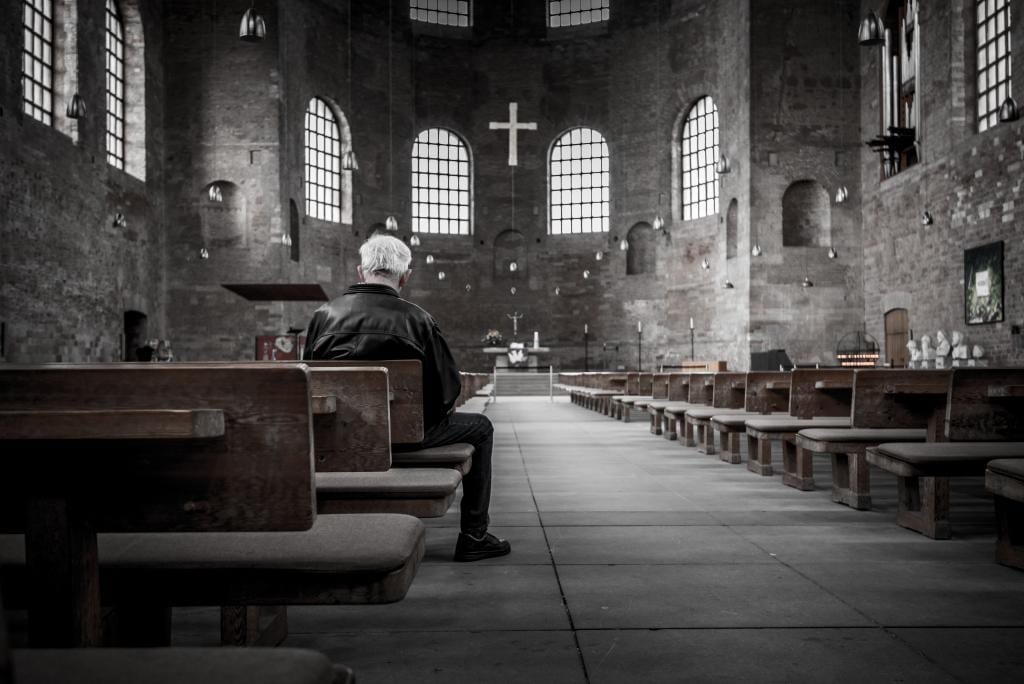
I remember hearing my grandparents recall a time when the local church was the epicenter of community events and social gatherings. They used to reminisce about the days when they used to attend movie nights and dances that were hosted in the parish hall while they were dating. It seems as though their generation lived in a golden age when much of their neighborhood was united by the fellowship of Catholic culture.
But as the years passed by, the local parish in my hometown began to dwindle in attendance. In a building with a capacity for nearly 200 people, I remember seeing an average of 10 bodies sitting in the pews by the time I was 15 years old. These people usually sat further apart from each other in their ‘designated spots’ as though their names were carved in the very wood the pews were made of. On more than one occasion, the priest reprimanded everyone for distancing themselves from their fellow neighbors and not acknowledging each other. Unfortunately, this didn’t exactly encourage anyone in the slightest and everyone mostly kept to themselves.
Given the all-time low attendance at my home-town church, the elderly members greatly outnumbered the youth – which doesn’t say much for what the parish had to offer regarding programs or events. There was no youth group, Bible study or anything geared towards encouraging the kids to explore the Catholic faith. Because the ministries were largely dominated by the elderly members, passing the responsibilities to the youth was like pulling teeth due to stubborn rigidity.
In the midst of having a difficult school-life, my parents realized I needed a change of scenery and a chance to make a solid group of friends before entering high school. Through a colleague, they found an opportunity to attend a youth conference and a summer camp through an Evangelical denomination in a nearby town. Prior to this, I was apprehensive that going to these events would be like sitting through another painfully boring mass. But to my surprise, it was the complete opposite! The high-energy atmosphere, engaging activities and music was something I never would have expected from a church setting! The countless friendships I gained from this youth ministry carried through into high school and even lasted to this very day.
From my perspective, the Catholic parish I grew up with has done a craptastic job at evangelism and fellowship, especially for the youth. This isn’t to say that the Church as a whole ought to alter their traditions, compromise their teachings and keep up with current trends to draw people inward. But from my understanding it seems to be a common issue within Catholic culture here in North America.
One particular thing that has always bothered me is how many people in Catholic congregations would show up at mass just to receive communion and bolt out the door like a bat out of hell before the liturgy would end rather than sticking around to engage in conversation with their fellow parishioners. In many Evangelical churches (especially at a smaller scale), this is almost unheard of. One of the things I admire most about my Protestant friends is how they are so willing to go out of their way to build relationships with people, and how receptive they are when it seems like someone could use a helping hand, people to confide in or even something as simple as prayer.
A community that cares very little for its own flock, especially its youth, is surely guaranteed to die off. Like children who don’t feel welcome or loved by their families in their own homes, it’s only a matter of time before they search for that sense of belonging elsewhere – or possibly in the wrong places.
One of the many factors that peaked my interest in reconsidering Catholicism was when I found out a few friends of mine attended a weekly rosary prayer group. I had viewed the rosary as a form of punishment as an adolescent, but what changed my perspective was seeing Catholics my own age saying the prayers willingly – not out of an obligation to follow rules, but out of a genuine love for God! And the current parish I attend has a unique layout where there are only a small number of pews in the back and the rest is sitting floor space where families with kids can partake in the mass without anyone raising an eyebrow when children cry. I never would have imagined any of these in the community I grew up in, but only comes to show that there are some Catholic communities that break the stereotypes.
It’s easy for me to point out all the negative experiences I’ve had in both Catholic and Protestant circles. But had it not been for the fellowship I gained from my Evangelical Christian friends, I would never have given Christianity a second thought, let alone return to the Catholic faith. I found myself looking back to my experiences attending youth group and summer camp, and realized I have so much to be thankful for. There is tremendous value in what the Evangelical church does regarding how they minister to their communities. One could say most Protestant denominations have the formula for evangelism and fellowship nailed to a T – no pun intended.
Because of this realization, I believe Catholics and Protestants can certainly learn from each other.
The deep and personable fellowship of the Evangelical community is what I miss most now that I identify as a Catholic. With this in mind, it’s easy to consider church-hopping for the sake of finding a new community or group of friends. But what I find interesting about those Catholics who show up just to receive communion is maybe what they are doing, in one extreme, is putting God first. If we love God the way we say we do, then the social aspect of a church community should really come second.
But just as iron sharpens iron, people aren’t meant to go through life alone.
In another extreme, sometimes where many churches excel in drawing people inward, they fall short in other areas as their congregations grow. In my church-hopping experience, I noticed a common trend with certain modernistic churches was an overemphasis on making church seem ‘cool’ at the expense of sound theology. I can certainly appreciate people who desire to create a welcoming environment where everyone can feel like they can come as they are as they walk through the door.
But there comes a problem when the main attraction of a church service is the social aspect as opposed to worshiping and receiving Jesus.
One of my atheist friends once said that many churches needs to stop pretending to be something they are not – and I couldn’t agree more. If the sole purpose of church is to become a social club, then how does it set itself apart from other means of leisurely gatherings? Why should I get a coffee from the barista in the church foyer when there’s a Starbucks down the road? Why would I want a contemporary worship band combined with stage lighting and flashy, epilepsy-inducing video screens when I could have a similar stimulating experience at an actual rock concert? Why would I want a hip and trendy pastor to give me a pep-talk about self-love when I can find a similar TED-talk on Youtube?
If all these things can be found elsewhere, then what does Christianity offer that the world does not? And what does the Catholic Church offer that cannot be found in other churches?
In my perspective, Evangelicalism offers a chance for people to be introduced to a relationship with Christ through reading Scripture and through fellowship in a church-family the way God’s love ought to be shared. Simultaneously, I believe the Catholic Church offers the fullness of Christian faith through the Real Presence of Christ in the Eucharist, a rich theology deeply rooted in Scripture, a history that can be traced back through Apostolic succession, and a united communion that spans around the globe.
I also believe the Catholic Church has the potential to offer the same type of welcoming fellowship our Protestant brethren have shared so well.
The Church will never fulfill its purpose if we continue to keep to ourselves and expect people to come to us. While many believe the responsibility of encouraging fellowship rests solely upon the priests and clergy, its the laypeople who collectively make up the dynamic of a congregation even more so. The Catholic Church needs passionate people who can step up and exercise their God-given gifts to share the Gospel to those outside of our bubbles in a language people can understand, and to make their parishes a desirable community to be a part of.
As the Scriptures say, the harvest is plentiful yet the laborers are few.












